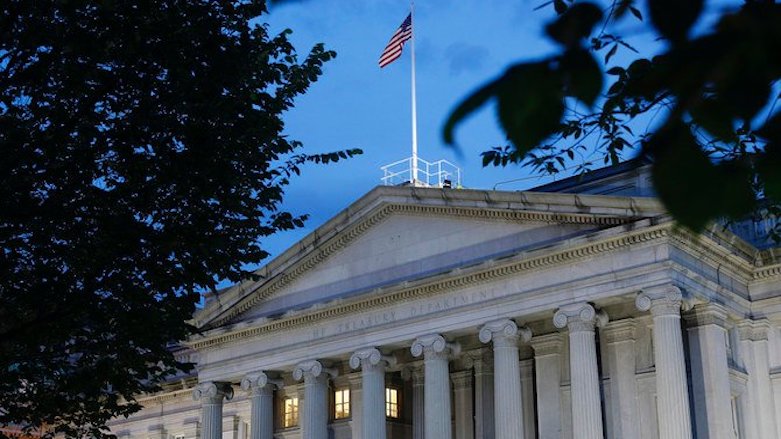US sanctions PMF Deputy Head, Abu Fadak
The US announced on Wednesday that it was imposing new sanctions on the Deputy Head of the Popular Mobilization Forces (PMF), Abdul Aziz al-Muhammadawi, also known as Abu Fadak.

WASHINGTON DC (Kurdistan 24) – The US announced on Wednesday that it was imposing new sanctions on the Deputy Head of the Popular Mobilization Forces (PMF), Abdul Aziz al-Muhammadawi, also known as Abu Fadak.
Muhammadawi replaced Abu Mahdi al-Muhandis as head of Kata’ib Hizbollah (KH), following Muhandis’ death last January in a US drone strike, targeting Gen. Qasim Soleimani, head of the Quds Force of Iran’s Islamic Revolutionary Guard Corps (IRGC-QF.)
As explained in the State Department press release announcing the new sanctions, KH was established in 2006. US-led forces were then still fighting in Iraq, after toppling Saddam Hussein and his regime three years before.
The primary enemy then was the Sunni insurgents, who had lost power and standing after the regime’s overthrow. However, Iran soon sought to exploit the disarray by establishing its own position and influence in Iraq.
Wednesday’s State Department announcement described KH as “an Iran-backed terrorist organization that seeks to advance Iran’s malign agenda,” noting that KH has “claimed responsibility for numerous terrorist attacks in Iraq” which include improvised explosive devices, indirect fire and rocket propelled-grenade attacks, as well as sniper operations.
In addition, the State Department charged that KH has been involved in “the killing, abduction, and torture of peaceful protestors and activists in Iraq.”
Early ties to Iran
The ties to Iran of the 52-year-old Muhammadawi go back over 30 years to the late 1980s, when he became a member of the Badr Corps—established by Tehran in 1982, as it became locked in a protracted war with Baghdad that would last another six years.
Muhammadawi’s terrorism against the US-led coalition in Iraq actually began in 2004, even before KH was established. Subsequently, he became an early member of the organization, “developing a close rapport” with Soleimani, as well as Imad Mughniyeh, a senior figure in Lebanese Hizbollah, as Michael Knights, a Fellow at the Washington Institute for Near East Policy, explained (Mughniyeh was killed in a 2008 car bombing in Damascus, reportedly carried out by Israeli and US intelligence.)
Muhammadawi has also been involved in training Bahraini terrorists and fighting in Syria under IRGC-QF command, Knights stated.
Recent Actions against the Baghdad Government, US-led Coalition
Last June, Iraq’s Counter-Terrorism Service pre-empted KH plans for a rocket attack on the US embassy and the Baghdad airport, as it arrested 14 KH members, along with one “foreign national”—i.e. an Iranian.
Muhammadawi responded by gathering 150 armed militiamen in some 30 pickup trucks and driving with them to the residence of Iraqi Prime Minister Mustafa al-Kadhimi in Baghdad’s supposedly secure Green Zone and demanded the release of the KH prisoners.
A stand-off ensued, and the KH prisoners were transferred to the control of the PMF security branch. Subsequently, they were quietly released.
Sanctions against Iranian Foundations
The US also announced on Wednesday new sanctions against two Iranian foundations run by the country’s Supreme Leader, Ayatollah Ali Khamenei: The Execution of Imam Khomeini’s Order (EIKO) and Astan Quds Razavi (AKR.)
“While purportedly charitable organizations (bonyads),” a Treasury Department statement affirmed, “EIKO and AQR control large swaths of the Iranian economy, including assets expropriated from political dissidents and religious minorities.”
“Bonyads are opaque, quasi-official organizations generally controlled by current and former government officials and clerics that report directly to the Supreme Leader,” the statement explained.
They receive benefits from the government, “including tax exemptions, but are not required to have their budgets publicly approved.” The result is a vast sprawl of economic activity “far beyond their original remit.”
AQR’s main responsibility, for example, is to oversee operations of the Imam Reza shrine in Mashhad, in eastern Iran. However, AQR’s “vast economic empire” includes “entities involved in logistics, automotive manufacturing, mining, energy, financial services, and the manufacturing of tile.”
That includes the following companies: Shahab Khodro Co., Iran Combine Manufacturing Co., Quds Razavi Housing and Construction Co., Quds Razavi Mines Co., Quds Razavi Traditional Tile Co., Razavi Brokerage Firm, Razavi Oil and Gas Development Co., and Razavi Supply Chain Management Co.
According to the Treasury Department, the two foundations sanctioned on Wednesday, along with a previously sanctioned foundation (Bonyad Mostazafan) and Khatam al-Anbiya, a construction firm run by the IRGC, also previously sanctioned, control over half of Iran’s economy.
The result is “systemic corruption and mismanagement,” the Treasury Department stated, “with only low level or isolated actors being held to account by the regime.”
Editing by Karzan Sulaivany